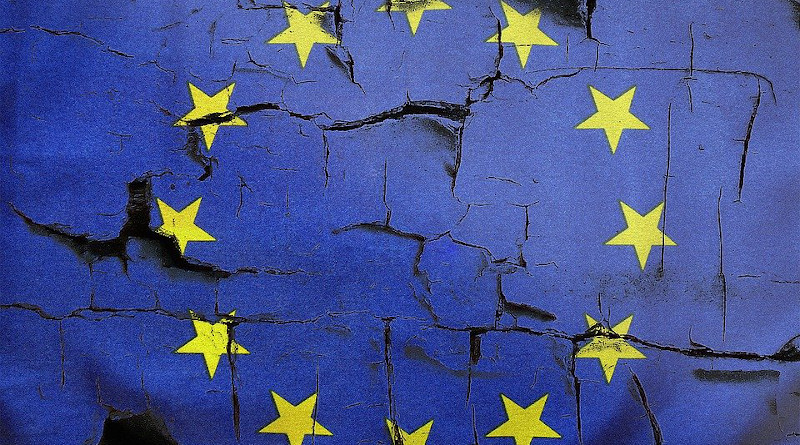Is Goldman Sachs Poised To Takeover Europe? – OpEd
By Mike Whitney
Goldman Sachs is about to take over Europe, but you wouldn’t know it by reading the papers.
On Tuesday, G-Sax alum, Mario Draghi, will take the helm at the European Central Bank replacing retiring ECB president Jean-Claude Trichet. The appointment has slipped by the media virtually unnoticed even though the ECB is the most powerful institution in the EU and is likely to play a critical role in solving the debt crisis.
Draghi was formally a Managing Director at Goldman. He also served as an advisor to the Bank of Italy in 1990, chairman of the Italian Committee for Privatisations, and was an Executive Director of The World Bank from 1984 to 1990. His bio. affirms his globalist pedigree which makes him the perfect candidate to replace the curmudgeonly Trichet who failed to comply with all of Big Finance’s demands. That’s not likely to be the case with Draghi.
The new ECB chief faces the difficult task of trying to pacify Germany while implementing policies that are opposed by the German political class as well as the German people. It won’t be easy, even for a skilled diplomat like Draghi. But Draghi will move forward with his bank-centric agenda, because it may be the last chance to keep the 17-member monetary union from disintegrating.
First, he will lower interest rates by .50 basis pts (from 1.5% to 1.%) at the ECB meeting on November 3 even though headline inflation in the eurozone is presently 3 percent and even though the move is bound to raise eyebrows in Berlin. Then he will announce that the ECB will step up its controversial bond buying program (already 170 billion euros) in order to push yields on soaring Italian debt below 6 percent. The Italian 10-year bond has zoomed to over 6.15 percent since the EU leaders announced their “breakthrough” agreement last Thursday. That means that bondholders do not believe the deal will solve the crisis. Draghi will act quickly to address the situation despite German opposition. Italy has 1.9 trillion euros in debt, 200 billion of which will come-due next year. Rising yields pose an existential threat for the faltering country.
In exchange for ECB support, Draghi will demand that Prime Minister Silvio Berlusconi (Bunga-bunga) push through unpopular reforms that target the unions and pensions. Italy will also be required to privatize more of its public assets and services. At the same time, the bank bailouts will continue mainly through easing new capital requirements and by underwriting bank debt so banks can issue bonds that are guaranteed by the ECB. Here’s the scoop from Bloomberg:
“European banks, which need to refinance more than $1 trillion of debt next year, may struggle to fund themselves until policy makers follow through on a pledge to guarantee their bond sales.
European Union leaders promised this week to “urgently” look at ways to guarantee bank debt in a bid to thaw funding markets frozen by the sovereign debt crisis. Lenders have found it hard to sell bonds for the past two years and have increasingly turned to the European Central Bank for unlimited short-term emergency financing…
In the U.S., the Temporary Liquidity Guarantee Program allowed banks to issue bonds with backing from the FDIC for as long as three years…
European governments including France, Spain, the U.K. and Germany guaranteed some bonds issued by their banks to reassure investors after the collapse of Lehman Brothers Holdings Inc. in September 2008. In May 2010, the EU ended the program when it said banks that relied on the pledges would face a review of their long-term viability.” (“European Bank Debt-Guarantee Proposals May Struggle to Thaw Funding Market”, Bloomberg)
Guarantees on bank debt is a direct subsidy to big finance, which is why we think that a former G-Sax exec. will support the policy.
Draghi is no fool, he knows that the German plan that was announced last week is more of the same “extend and pretend”. It has no chance of ending the crisis. Regardless of the stock market’s (positive) reaction, borrowing costs are still rising, the credit markets are in turmoil, and the clock is ticking. It’s now or never. Either the ECB takes the initiative and acts as lender of last resort or the eurozone is toast.
50 percent haircuts on Greek debt won’t put Greece on a sustainable growth-path anymore than a $1.4 trillion pile of money will ward off the bond vigilantes. It’s all just more “arranging the dect chairs”. Draghi’s job is to return to first principles, that is, When you are in a hole, stop digging.
The new ECB president is not so obtuse that he will solicit China to support the eurozone either. (Talk about muddled thinking?!?) The eurozone doesn’t need China; it can support itself, and it can do so without its two powerhouse nations being needlessly downgraded because policymakers can’t figure out how the monetary system works. Draghi knows how it works. Paper goes in one end and comes out money on the other. That money makes all the difference in the world. It can boost economic activity, recapitalize underwater financial institutions, and lower borrowing costs.
The central bank’s new approach will put the ECB on a collision course with Germany. This is a clash that can no longer be avoided. Draghi’s job is to save the union for the financial elites who benefit from it. Ultimately, their interests will prevail over Germany’s. You can bet on it.
Naturally, no one cares about the public’s interest. The EU’s working people don’t count.

